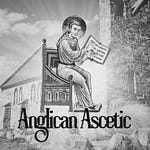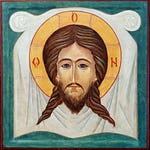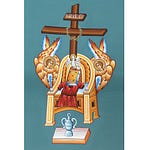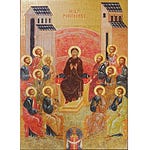[Note: the audio recording above will vary in places from the prepared text below.]
On this Stewardship Sunday, I want not only to reflect on Christian Stewardship, but to see ourselves as a coin. In a parable, Our Lord Jesus said the kingdom of heaven is like a woman with ten coins, who lost one – which when found was a cause for rejoicing by her and the angels. What is the significance of this, you might wonder. It comes from teaching from the 7th century Church Father, S. Gregory the Great, who is a huge influence upon all of western Christianity. He gave his immense voice and interpretation to the Parable of the Lost Coin, seeing the woman as representing Holy Church, the nine coins being the nine orders of Holy Angels, and the tenth coin, the one lost, being humanity, all human beings. In essence, S. Gregory taught to understand ourselves as a coin: God’s coin, of immense value because the coin is His.
Yet before I go further with this, let us consider our Gospel passage today. Jesus asks for and is given a coin by the Pharisees. He then asks, “Whose likeness and inscription is this?” They were trying to entangle Jesus, so that they would have grounds to arrest Jesus, who was a very popular figure in and around Jerusalem. If they could get Jesus to say, “Don’t pay taxes,” then they would have the grounds they were looking for. By this time, Our Lord is quite used to the Pharisees trying to trick Him. And He often responded to their question with another, deeper question, His question undermining their question and disabling it, showing it to be superficial, showing it to be a red herring, a distraction from their real purpose, which was to arrest Him. Jesus asking, “Whose likeness and inscription is this?” forced them to answer. Jesus, as they say, put the ball back into their court. Something, unto itself, that can be a teaching to us: when we feel someone is asking what on the surface is an innocuous question, but that we suspect malevolent intent, respond not by answering but by asking a question.
What is notable about the particular question our Lord asked was that, for us, it has a deeper significance. In effect, Jesus is asking, “Whose image and writing is this?” The answer to that question, of course, is Caesar’s image and Caesar’s inscription, making it to be a product of the Roman empire. And because of that, the coin goes to Caesar. But, whose image and inscription is written upon us? Are we not in God’s image, and His image in us? Did not God write His law upon us, made in His image? Jeremiah 31:33 records God as declaring: “I will put my law within them, and I will write it upon their hearts; and I will be their God, and they shall be my people.” So if things are to be given to those whose image is on the thing, then, yes, render therefore to Caesar the things that are Caesar’s, and to God the things that are God’s. This is why they marveled: the Pharisees were outdone by the Word of God. And so this idea that human beings are like to a coin lost, searched for, and when found, rejoiced over becomes a key to stewardship in the Christian understanding.
We are a coin, made by God. We are God’s coin. God made us so that we would of our free will choose to offer ourselves back to Him, the Maker of all creatures great and small, the maker of heaven and earth, of all things seen and unseen. It was what our patron Saint Paul means by being a living sacrifice: and what our Liturgy speaks of, and here we offer and present unto Thee, O Lord, our selves, our souls and bodies, to be a reasonable, holy, and living sacrifice. To offer to God our time, our talent, and our treasure is simply “our selves, our souls and bodies” put into different words. It is why Saint Luke recorded in the Acts of the Apostles the account of Ananias and his wife Sapphira, who sold a piece of property. They kept back some of the proceeds, and Saint Peter regarded this was Satan filling the heart to lie to the Holy Spirit. We are told by Saint Luke that both fell dead, because of their greed and as well as deception with Holy Church. It is a dramatic story, which comes in the fifth chapter of Acts. It is a dramatic story, but the very least it should teach us is that knowing holding back of our time, talent, and treasure from the Church is something God sees, for God is He unto Whom all hearts are open, all desires known, and from Whom no secrets are hid – holding back from the Church that which God knows we have available to offer, but choose not to, God regards negatively, and pulls His active presence away, so as to cause at least spiritual death, which is what we call the way of life in which God pulls His presence away, leaving us cold in our spiritual life.
My dear brothers and sisters, as I have said before, and will say undoubtedly many times: All God wants is our heart. When we know that God made us so that we would of our free will choose to offer ourselves back to Him – to offer whatever time, talent, and treasure we have available back to God becomes an expression of who we truly are. And what’s more, to know that we all must one day give account to God, as to whether we have been faithful stewards of the bounty of time, talent, and treasure God has given to us, attests to our true identity. We are God’s coin. Hence, we honor God by our stewardship. We honor the Church by our stewardship. We honor the unfathomable gift of eternal life given to us by the sacrifice of Jesus Christ in His Incarnation as well as in His Crucifixion by our stewardship. We are made in God’s image, His image is upon us, and His Holy Spirit is written upon our hearts. We are God’s, that as poor as we might be, we are always able to give Him our heart. Amen.











Share this post